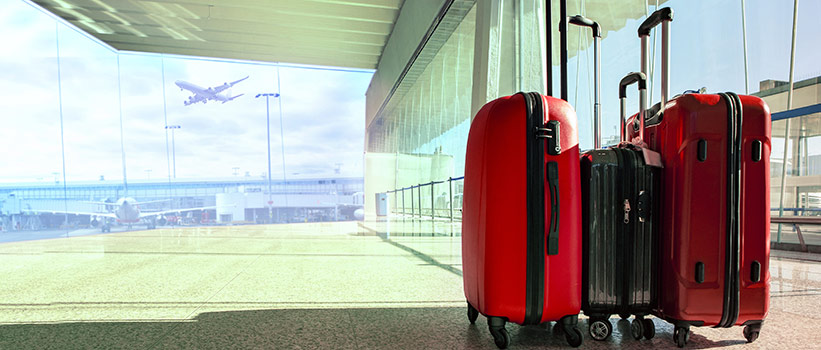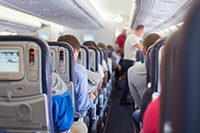Traveling Safely with Heart Disease
BIDMC Contributor
FEBRUARY 01, 2018

Planning Ahead Can Help Keep Your Trip on Track
This winter, millions of people will be traveling to destinations near and far — from nearby family visits to faraway vacations in exotic locales.
“A common question I get from patients is whether it’s safe for them to travel with a heart condition,” says Eli Gelfand, MD, Section Chief of General Cardiology in the CardioVascular Institute at Beth Israel Deaconess Medical Center. “And in most cases the answer is an enthusiastic ‘yes.’”
Whether you’re visiting a new destination or returning to a favorite vacation spot, getting away can be good for your health, says Gelfand, a veteran traveler whose trips have taken him around the world, including to Kenya, China and Cuba, where he has led global health teams to train doctors and nurses and aid patients.
“Getting away doesn’t have to involve leaving your home for weeks at a time, flying for hours or visiting exotic locations. Our bodies and minds can derive just as much rest from a weekend with friends an hour’s drive from home as from two weeks in the Amazonian jungle.”
 The key to a safe journey, Gelfand (right) notes, is advance preparation.
The key to a safe journey, Gelfand (right) notes, is advance preparation.
“By carefully planning ahead and occasionally, making small modifications to travel plans, people with heart conditions can enjoy their trips without worrying about their health.”
Here are Gelfand’s recommendations to get ready for your trip.
Five Questions for Your Doctor
Before you make any reservations, talk with your doctor about your travel plans, especially if you have undergone a recent heart procedure, use oxygen intermittently or chronically, or been prescribed a new medication.
Questions to ask:
- Is it safe for me to fly, including on long flights of eight hours or more?
- Is it safe to visit high-altitude destinations?
- How can I reach you if I have concerns while I’m away?
- Check on your doctor’s office hours and phone number and write them down to take with you.
- Find out what number to call outside of regular office hours, but in an emergency, seek immediate treatment at a local hospital.
- Take note of any time difference between your home and vacation destination.
- Am I up to date on my routine immunizations?
- The U.S. Centers for Disease Control and Prevention (CDC) recommends that all international travelers be up to date on measles and other routine vaccines, even if they’re headed for a quick trip to Europe.
- Are any special immunizations required for the country I’ll be visiting?
- Doctors in BIDMC’s Travel Medicine & Immunization Clinic can review patients’ travel plans to determine which particular immunizations are needed, and can review patients’ medical histories for any possible side effects.
Three Medication Musts
As you start planning your trip, put together a full list of all the medications you are currently taking — prescription and over-the-counter — and the specific doses. Bring this list with you when you travel. Another option is to bring along copies of your original prescriptions.
Other tips for managing medications include:
- Refill prescriptions before you leave home and make sure you have enough medication to last your entire trip, as well as an extra few days’ worth in case you are delayed for any reason.
- Pack medications in a place where you can easily reach them while you are traveling. If you are flying, pack medication in carry-on luggage. It’s also a good idea to keep a bottle of water with you and have snacks on hand, in case you need to take medication with food.
- Take time zone differences into account if you take your medications at a particular time of day or evening. You may want to keep a watch or clock on "home time" and continue to take your medication at the normal time. If you are traveling to a time zone more than two or three hours different from home, you can adjust your medications to the new time zone, making sure not to take more than prescribed during a 24-hour period.
Up and Away: Three Tips for Airplane Travel
 By and large, air travel is safe for patients with heart conditions. Since 2004, all airports and airplanes have been equipped with automatic external defibrillators (AEDs) and although the risk is small, it can be reassuring for patients to know that these devices are in place in case of emergency.
By and large, air travel is safe for patients with heart conditions. Since 2004, all airports and airplanes have been equipped with automatic external defibrillators (AEDs) and although the risk is small, it can be reassuring for patients to know that these devices are in place in case of emergency.
Patients with a history of congestive heart failure, congenital heart disease or lung disease should be aware that despite cabin pressurization, the air in the plane’s cabin is still much thinner than it is on the ground. This impacts how oxygen is carried through the blood, and means that your heart has to work harder. Talk with your doctor about this.
Other tips for safe airplane travel:
- Move around. Sitting for long periods of time can slightly increase the risk of blood clot formation in the veins of the legs, arms or pelvis, especially in patients who have peripheral artery disease (PAD) or heart failure. Because transcontinental routes can span 10 hours or more, Gelfand recommends that travelers get up and move around, at least every two hours. To make this easier, request an aisle seat when making your plane reservations. Your doctor may also recommend you wear compression stockings.
- Stay hydrated. It’s particularly important to stay hydrated when you’re on the plane and when you are in a high-altitude location. Besides drinking plenty of water, Gelfand recommends that you stay clear of salty snacks, and avoid alcohol and caffeinated beverages to prevent dehydration.
- Low-sodium snack recipes: make ahead to avoid salty snacks on the plane
- Prepare for metal detectors. Most people can travel safely with a pacemaker or another implantable cardiac device. Be aware that although full body scanners at the airport will not harm pacemakers or change the settings, they may set off metal detector alarms. Ask your doctor for a letter to have on hand when you go through airport security or show your medical device card to the Transportation Security Administration official. You may be asked to not go through the metal detector.
Four Facts About Food
Although enjoying local cuisine is an important part of any trip, Gelfand recommends that patients talk with their doctors in advance to help avoid getting sick, especially in developing countries. His advice:
- Follow the basic food and water precautions recommended by the Centers for Disease Control and Prevention (CDC). These include eating only food that is cooked and served hot, drinking only beverages from sealed containers, and avoiding ice. The CDC's mobile app Can I Eat This? can also help you determine what foods and beverages are safe.
- If you are on a special diet at home, stick to your diet as much as possible during your trip. If you have cardiomyopathy or heart failure, take special care to drink plenty of fluids and avoid eating too much salt.
- Talk with your doctor for his or her recommendations when it comes to alcohol, particularly if you have been diagnosed with an irregular heartbeat. Dangerous heart arrhythmias — sometimes known as "holiday heart syndrome" — can develop after drinking multiple alcoholic beverages, which might be more likely when you’re on vacation.
- Be diligent about keeping your hands clean. The CDC calls hand-washing a “do-it-yourself vaccine,” when it comes to staying healthy. If soap and water are unavailable, the CDC recommends travelers use a hand sanitizer that contains at least 60 percent alcohol.
Emergency Situations
In an emergency, always seek immediate treatment at a local hospital before contacting your doctor.
Gelfand also advises patients traveling abroad to look up the emergency services number for your destination country prior to leaving home, and use mPassport, a handy phone/tablet app that allows you to look up emergency numbers, local physicians and local safety alerts.
